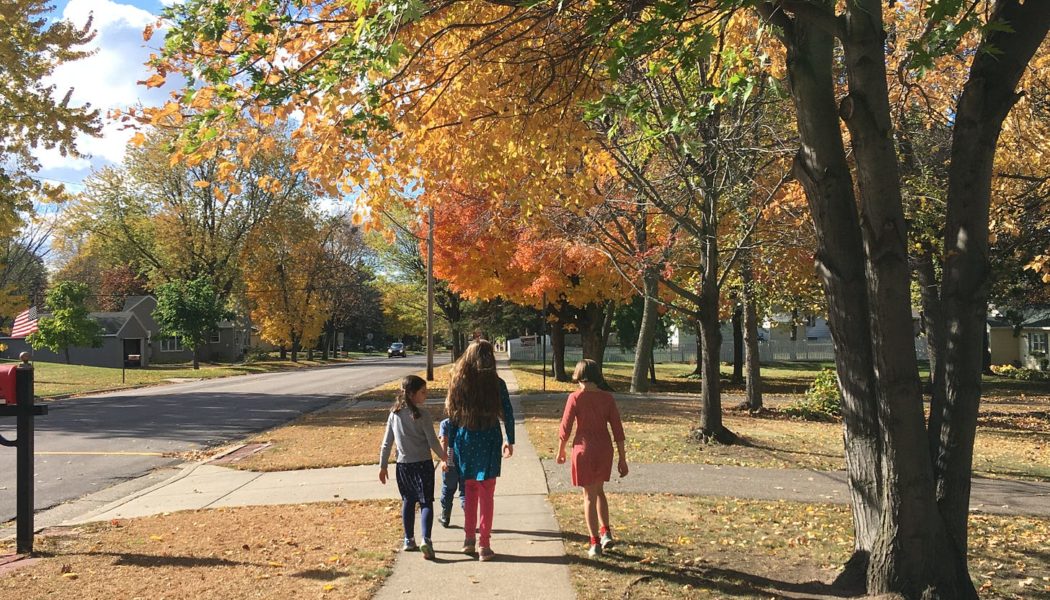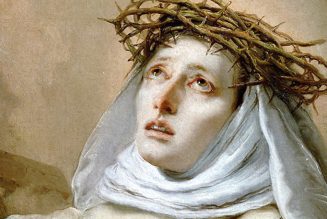Sadie stood on the boat, heavy with child, a toddler clinging to her hand, the shores of France shrinking into the distance. It had been weeks already since she had left her home in Lebanon—where she had lived with her fellow Christians in fear and poverty due to Ottoman persecution. At the age of eighteen, she was going with her twenty-two-year-old husband to a place called St. Louis in the Americas, where his brother lived. My great-great-grandmother took a deep breath, centering herself in her faith, which she would need as she traveled surrounded by unfamiliar languages, sleeping in steerage, going to a great unknown.
Dorothy waited behind the lunch counter in Joliet, Illinois, surrounded by flat, sweeping land. She was serving the men who came down the line. Her apron was tied neatly around her waist, as he looked her in the eye. He reached up and touched a napkin to her lips. “My friends thought you were wearing lipstick, but I knew it was your natural color.” I wonder what she did after that in that moment, because she eventually married him and became the mother of my father’s mother.
Colette sat tiredly over her desk in the west suburbs of Cleveland. It had been a long day teaching her students, and she came home to an ambiguous letter, where the man she loved did not commit himself, once again. She was fast approaching her thirties. She pulled out a sheet of paper, and began to write: “It’s National Catholic Vocations Week. Are we going to ‘vocation’ together?” He finally did get his act together, and my grandfather was their oldest child.
Kay held her second child, my grandmother, in her arms, gazing out at the grey skies—always grey skies—in Western New York. Her Irish blood coursed through her body as she thought about her tall, athletic, husband coaching football just a few miles away. She sighed and picked up a book. Books had been a refuge for her during her entire life, having lived through the death of her mother at the age of ten and her father’s absent career-oriented life. She was thankful to her grandmothers for their care in raising her. And now she did her best to love her handsome husband and two little children in the midst of the Great Depression.
These are the women who came to my imagination—the Catholic women who came before me, the immigrant and the granddaughters of immigrants—as I read Betty Smith’s A Tree Grows in Brooklyn. Smith opens with the image of a tree, the one that grew up outside the main character Francie Nolan’s fire escape, but also all over Brooklyn:
Some people called it the Tree of Heaven. No matter where its seed fell, it made a tree which struggled to reach up to the sky. It grew in board-up lots and out of neglected rubbish heaps and it was the only tree that grew out of cement. It grew lushly, but only in the tenement districts. (Philadelphia: The Blakiston Company, 1943. Ch. I, p. 1)
The book presents this tree as a symbol of the perseverance of the immigrants living in these tenements, Francie being the daughter of first-generation American’s whose parents were immigrants. Her father is Irish, and her mother is German. The book is the story of her childhood: the family’s efforts to get by day to day, the way immigrant children were treated by the public school system, how the poor were bribed by political parties for their votes. But mostly, it is the story of how parents who brought their family to America tried to make the lives of their children better.
I picked up the book because a friend gave it to my daughter as a gift and for years I have seen it on lists of books one ought to read. I did not realize until I was partway through that Catholicism plays a central role in it. And for me, that tree growing in Brooklyn has begun to symbolize something more than just the perseverance of the poor. It is the Catholic faith passed down through the generations—the seed of faith hitting the ground, trying to grow in the lives of immigrants and their children, a seed which still struggles in America today. It makes me wonder: while we might be materially better off, did the uprooting of Catholics from a home country where Catholicism was the culture really make them better off? But I suppose we could look at the state of Catholicism in Europe and say it is not much better there.
So many factors led to a sort of diaspora of the poor from culturally Catholic lands. Many of my German ancestors came because of oppressive Prussians and their inherited lands no longer supporting them. The Irish came because of the famine. The Lebanese came because of the Ottoman Empire. And these are just the stories I know something about—I have a variety of other ancestries. Oppression and need led them to uproot their lives and find new soil. While the lives of their children eventually improved materially, despite facing anti-Catholicism in the United States, did the seeds of faith grow here?
I think particularly of the women in my ancestry when I think about immigrants and Catholicism, as it is often the woman who passes on the family culture of her home while giving up her family name, as Gertrude von le Fort points out in The Eternal Woman. Yet, there are so many studies that show how the father must also practice his faith for children to remain in it when they grow up—both factors seem important. Children’s faith often becomes compromised when the parents are not united in it. This is seen in A Tree Grows in Brooklyn through Francie’s German immigrant grandmother Mary Rommely, praying her rosary, always turning to her faith, while her husband seems actively angry at the Church. (We do learn later in the book that he donates his time and skill to carve the altar of their parish church.) How their children turn out—one divorced and remarried many times, one a convert to Episcopalianism, the third a nun, and the youngest married to an Irishman attending Mass every Sunday—seems to indicate that Mary Rommely’s faith was not enough in itself for all her children to remain Catholic. But among the three lay daughters, hints of a seed of the faith crop up. In fact, it seems like the lack of catechesis and education is the main hindrance to understanding and growing up in their faith.
For example, Sissy thinks that as long as she does not marry in the Church nor actually get a divorce, she is closer to church teaching even with her multiple husbands and lovers. She knows that Catholics can’t get divorced, but she is counting on eventually tiring of each of her husbands. So, she does not get divorced, but just civilly married again. (Which says something about public record keeping in the early twentieth century.) Perhaps if she had been taught the true meaning and unitive nature of the sexual act instead of a set of rules about marriage and divorce, she would have been able to live in the fullness of the Catholic faith. But her desire for deep union with another was never fully directed to God, and no one showed her how marriage is an image of the love between Jesus and the soul.
The second daughter, Evy, sends her kids to Episcopal Sunday School, because she has decided that she wants to live a “refined” life as an American. Her goal is not living her faith, but fitting in with those she admires. This is one of the main reasons American Catholics have such a hard time staying Catholic. If Evy had been raised in the Catholic part of Germany where her parents came from, her desire to fit in would have been fulfilled by remaining Catholic. But her parents left the old soil of Germany for the new soil of America, where all the various seeds grow together and fight for light. The Catholic faith can be choked out if one cares more about worldly things than the love of God. Evy’s desire for Beauty Himself was misdirected to a desire for the beauty of a refined life, of communion with one’s refined neighbors. We are meant to live in community on earth as we will live in the community of Heaven. This is a good desire, but American Catholics have to be intentional about having this community with each other, especially in a society that is not culturally Catholic.
Francie’s mom Katie, the youngest daughter seems to stumble into a regularized Catholic life. She marries a handsome, but alcoholic, Irishman, and they struggle to have enough to eat day by day. But she is strong in her desire for her family to have a good life and goes to her mother for faith and support. Education, her mother tells her, is what her children need. So, Katie, with her sixth-grade education, reads her children a page of Shakespeare and a page of the “Protestant” bible every day—which is of course the King James Translation. (This is a great foundation for her children to be formed in beautiful images and language.) The Nolan family goes to Mass on Sunday, and Francie has a friend who walks with her to Confession every Saturday. But the bulk of her days are spent in her public school and then in her various jobs as a teenager, where the broader American culture penetrates her heart and mind.
But Smith, who bases the character Francie on herself, has some sense of the indelible mark of Baptism. Later in the book we read a scene of Francie praying at Christmas Mass:
“It’s a beautiful religion,” she mused, “ and I wish I understood is more. No. I don’t want to understand it all. It’s beautiful because it’s always a mystery, like God Himself is a mystery. Sometimes I say I don’t believe in God. But I only say that when I am mad at Him . . . Because I do! I do! I do believe in God and Jesus and Mary. [ . . . ] But good or bad, I am a Catholic and I’ll never be anything else. Of course, I didn’t ask to be born Catholic no more than I asked to be born an American. But I’m glad it turned out that I am both of these things.” (Ch. LXV, p. 304).
I could say the same thing about myself, my parents, grandparents, siblings, aunts, uncles, and cousins. We did not ask to be born American or baptized Catholic, but here we are with the seed of Catholicism waiting to grow into fullness within each of us. I often pray for my relatives, whose outward expressions of the gift of their Catholic faith varies.
I attended my grandfather’s funeral in Cleveland last Monday. (In your charity, please pray for the repose of John’s soul, as well as my grandmother Patricia who passed away last year.) Both of my grandparents grew up in their faith, remained in their faith, and passed it on to their children. I have so many memories of attending daily Mass with them on visits, seeing my grandfather praying with the readings, my grandmother holding a rosary. I know that once they are in Heaven, they will be interceding for their all of their descendants to be together in Heaven in eternity.
On the Sunday before the funeral, I had the gift of attending Holy Mass with some of my relatives at a parish near the house where we were staying. The priest was young and earnest about his faith, and he said Mass with a beautiful reverence for the Real Presence of Jesus in the Eucharist. There were numerous extraordinary ministers of Holy Communion spread throughout the church, which led to Father having about eight vessels to purify after Communion. As I watched his careful, consecrated hands, pouring holy water into each vessel, swirling it gently, and pouring it into his chalice, an image came to my mind.

It struck me how this young priest was being as careful as possible to gather up every little particle of the Body, Blood, Soul, and Divinity of Jesus from each of these vessels. And in my heart, I saw that the water symbolized the Lord’s ocean of mercy that was poured out on the world from the Cross. Each particle of His Precious Body and Blood symbolized every member of my family—my grandparents’ descendants—and that the Lord was going to sweep down with His mercy and gather them all into the chalice of His Blood. As Father tilted the chalice up and swallowed the water and particles, acting in persona Christi, I was filled with great hope that Jesus will bring all my family into the fullness of communion with Him in the Church Triumphant in Heaven.
The tree which grows in Brooklyn, the “Tree of Heaven,” drops the seeds of faith, seeds which struggle to grow no matter what the conditions. May the soul of Betty Smith, wherever her life carried her, in the end, have found the mercy of God waiting for her in the faith she seemed to love so deeply. And may God Bless America and bring this melting pot of faiths into the One True Faith.






